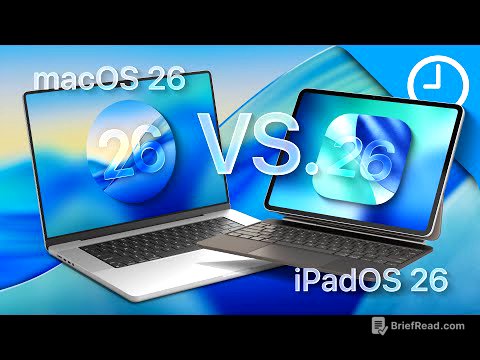TLDR;
This video provides a comprehensive guide to using linking words in English to create more complex and coherent sentences. It explains how these words connect ideas and improve clarity, offering numerous examples to illustrate their proper usage. The video covers a range of linking words, including "even if," "whereas," "moreover," "so that," and many others, providing clear definitions and practical applications for each.
- Linking words are essential for forming complex sentences.
- The video provides definitions and examples for over 20 linking words.
- Understanding and using these words can significantly improve English communication skills.
Introduction to Linking Words [0:00]
The video introduces the importance of linking words in English for forming sentences and connecting ideas. Linking words help in making big sentences by joining small sentences. Without these linking words, sentences can sound incomplete and disjointed, making it difficult for listeners to understand the intended meaning.
Even If [1:43]
"Even if" is used to express a condition that does not change the outcome. It is similar to "although." For example, "Even if it rains, I will go." This phrase indicates that the action of going will happen regardless of the weather. Another example provided is, "Even if I knew, I would not tell you," indicating that knowledge of something does not change the decision to withhold information.
Whereas [2:34]
"Whereas" is used to show contrast or comparison between two things. It can also mean "because," "when," or "as far as." For example, "Some people praise him, whereas others condemn him." This sentence highlights the contrasting opinions people have about someone. Another example is, "Some people like meat, whereas others hate it," illustrating different preferences.
Moreover [3:31]
"Moreover" means "apart from that" or "in addition to." It is used to add more information to a statement. For example, "It was a good car, and moreover, the price was quite reasonable." This sentence adds an additional positive aspect to the description of the car. Another example is, "He enjoys swimming, and moreover, he is good at it," indicating an additional skill or quality.
So That [4:33]
"So that" is used to express purpose or reason. It explains why something is done. For example, "He folded the letter so that it fits in her bag." This sentence explains the reason for folding the letter. Another example is, "Leave the handle down so that it can be opened," indicating the purpose of leaving the handle down.
Wherever [5:25]
"Wherever" means "wherever" or "any place." It indicates that an action or event can occur in any location. For example, "I will follow you wherever you go." This sentence expresses a commitment to follow someone regardless of their destination. Another example is, "You can go wherever you like," indicating freedom to choose any location.
Apart From [6:03]
"Apart from" means "besides" or "except for." It is used to exclude something or someone from a statement. For example, "He has never been apart from his mother." This sentence indicates a constant presence with his mother. Another example is, "Apart from that, he is a good human being," adding a positive attribute in addition to other qualities.
Rather Than [6:50]
"Rather than" means "instead of." It is used to express a preference or choice between two options. For example, "I chose to learn English rather than Urdu." This sentence indicates a preference for learning English over Urdu. Another example is, "I'd like to stay home this evening rather than go out," expressing a preference for staying home.
Whether [7:43]
"Whether" is used to express doubt or choice between alternatives. It is often used in questions or statements involving uncertainty. For example, "I doubt whether this story is true." This sentence expresses uncertainty about the truthfulness of a story. Another example is, "Ask him whether he can come or not," indicating a need to confirm his availability.
Eventually [8:54]
"Eventually" means "finally" or "in the end." It is used to describe something that happens after a long period of time or waiting. For example, "The train eventually arrived late." This sentence indicates that the train arrived after a delay. Another example is, "He worked so hard that eventually he made himself ill," describing the final outcome of excessive work.
Even Though [9:52]
"Even though" is used to express a contrast or concession. It is similar to "although" or "even if." For example, "He is the best teacher even though he has very little experience." This sentence highlights a positive quality despite a potential drawback. Another example is, "She never took a taxi even though she could have," indicating a choice despite having the option.
While [10:52]
"While" is used to show contrast or simultaneous actions. It can mean "during the time that" or "whereas." For example, "Some people live to eat, while I eat to live." This sentence contrasts different approaches to eating. Another example is, "While there is life, there is hope," expressing hope as long as life continues.
Besides [11:54]
"Besides" means "in addition to" or "as well as." It is used to add extra information or elements to a statement. For example, "Besides milk and butter, we need some vegetables." This sentence adds vegetables to a list of needed items. Another example is, "I don't want to go; besides, I am too tired," providing an additional reason for not wanting to go.
Because [12:52]
"Because" is used to explain the reason or cause of something. It is a commonly used word to provide explanations. For example, "This phone wants to start because of the low battery." This sentence explains why the phone is not starting. Another example is, "You are here because of me," indicating the reason for someone's presence.
However [14:13]
"However" means "no matter how much" or "however." It is used to indicate that something is true regardless of the extent or degree. For example, "I will come no matter how busy I am." This sentence expresses a commitment to come regardless of being busy. Another example is, "He will answer no matter how difficult the question is," indicating a willingness to answer any question.
Although [15:03]
"Although" is used to introduce a statement that contrasts with or seems to contradict something else. It is similar to "though." For example, "Although he was ill, he went to work." This sentence shows that despite being ill, he still went to work. Another example is, "Although the car is very old, it still runs very well," indicating that despite its age, the car functions well.
Unlike [15:45]
"Unlike" means "different from" or "not similar to." It is used to show a contrast between two things. For example, "His voice was quite unlike his normal voice." This sentence indicates that his voice was different from what it usually is. Another example is, "It's very unlike him to be so late," suggesting that being late is not typical for him.
Unless [16:36]
"Unless" means "except if" or "if not." It is used to state a condition that must be met for something else to happen. For example, "Don't call me unless there is an emergency." This sentence indicates that calling is only acceptable in case of an emergency. Another example is, "Unless there is a signature on the check, it is invalid," stating that a signature is required for the check to be valid.
Instead Of [17:30]
"Instead of" means "in place of" or "as an alternative to." It is used to indicate a substitution or replacement. For example, "Will you go to the party instead of me?" This sentence asks if someone will attend the party in place of the speaker. Another example is, "He used scissors instead of a knife," indicating that scissors were used as a substitute for a knife.
Yet [18:12]
"Yet" means "still" or "up to now." It is used to indicate that something has not happened or is still in progress. For example, "No man ever became great by copying yet." This sentence suggests that greatness has not been achieved through imitation. Another example is, "I cannot do this; I am not ready yet," indicating that the speaker is not prepared at the current time.
On The Other Hand [19:02]
"On the other hand" is used to introduce a contrasting point of view or option. For example, "I want to go to the party, but on the other hand, I have to study." This sentence presents two conflicting desires or obligations.
In Other Words [19:32]
"In other words" is used to explain something in a different or simpler way. For example, "He was not telling the truth; in other words, he was lying." This sentence clarifies the initial statement by rephrasing it. Another example is, "He left the job; in other words, he resigned," providing a clearer explanation of his departure.
Therefore [20:24]
"Therefore" means "for that reason" or "consequently." It is used to indicate a logical conclusion or result. For example, "He was busy; therefore, he couldn't come." This sentence explains that his inability to attend was a result of being busy. Another example is, "His car was big; therefore, it was more comfortable," indicating that the size of the car contributed to its comfort.









